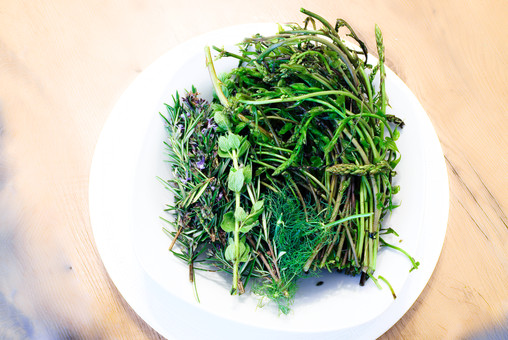How to transfer a living experience into a dish
- wanderbyparis

- Apr 16, 2019
- 3 min read
Updated: Nov 26, 2019
There have been many books, many hours of filming, and many interviews that describe a cook's experiences and how they affect his cooking. Sometimes with exaggerations, sometimes for purely commercial reasons, with emotionally charged words or music, tears of joy or nostalgic describe in a hidden way a reality, a need that exists for the creation of new recipes, personal and unique. What people involved in gastronomy have called Cuisine d 'auteur.
However, the recipe communicates our experience, it has a narrative that needs to be heard to appreciate the dish better, and perhaps mitigate the ephemeral gastronomic experience.


The recipe is based on the Greek tradition in terms of the products. Also in an experience that repeated every spring when Avronies were ready for collectingthem, and we to welcome the travellers to Oia in Santorini.
We knew that with the advent of the tourist season we would not have the time to have fun during the summer, so every year the Sunday before Holy Monday, we collect as many avronies as we needed and went to the tavern we were gathering. There we set up a little feast welcoming the spring and to say goodbye to the winter that was relieved us every year. The cook made us a huge omelet of avronies with a lot of lemons, he fried a lot of potatoes, and he treated us lots of wine until the early hours. It is a delicacy of Greek gastronomy, unknown outside of the country since Greek cooks avoid to use products which they are not in the vocabulary of the European or eastern gastronomy. As retailers of traditional European gastronomy, they appreciate that the harsh wild greens that nature generously gives us are just to make a salad at home or to use them at the taverns. There are exceptions, fortunately, some young cooks following the example of the bistronomique stream as they called it, turned to the Greek tradition to find inspiration to somehow join them in the new global trend of gastronomy.

Having a Greek restaurant in Paris, I wanted at least to share the products we use in Greek cuisine, to offer both the restaurant's guests and my colleagues who showed great interest, a new experience. A new proposal. Having been fortunate to be aware of more than one tradition, I managed to differentiate myself from the whole gastronomic scene, which was somewhat saturated with the same ideas.
On the occasion of the little feast in Oia, I presented the avronies to the Parisian audience. Using all my technique to show their interesting bittersweet character and to give other dimensions to the dish. Because no one of our guests in Paris was present to the feast in Oia so that his memory can work, the recreation of the omelette was useless, its impossible to live the way I lived the moment and the emotion of this moment can not be reproduced. At least I cannot.
So the recipe is coming only from the limitation of the product itself. Let's say that is autonomous, and we should lead it.
With no tears or nostalgia but with love and care...
I cook the avronies in salted boiled water for two minutes, and I immediately put them in chilled water to keep their colour alive and prevent overcooking them. I cooked the egg at 64 °C to get a creamy, rich yolk inside an elastic white. The potatoes were once confit in rosemary-flavoured olive oil and then glazed with smoked dashi. Finally, I have prepared a lemon-pepper mint emulsion to soften the bitterness of the avronies and give energy to the dish.
Everything must be measured to this dish the balance between the bitterness, the sourness and the acidity; also the iodine with the freshness of the peppermint create a complete recipe only with the correct amount and use of the ingredients







Comments